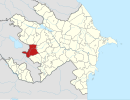Poghosagomer, Nagorno-Karabakh
Poghosagomer / Devedashy
Պողոսագոմեր / Dəvədaşı | |
|---|---|
| Coordinates: 40°07′18″N 46°37′00″E / 40.12167°N 46.61667°E | |
| Country | |
| • District | Kalbajar |
| Population (2015)[1] | |
• Total | 242 |
| Time zone | UTC+4 (AZT) |
Poghosagomer (Armenian: Պողոսագոմեր) or Devedashy (Azerbaijani: Dəvədaşı) is a village located in the Kalbajar District of Azerbaijan, in the region of Nagorno-Karabakh. Until 2023 it was controlled by the breakaway Republic of Artsakh. The village had an ethnic Armenian-majority population[2] until the exodus of the Armenian population of Nagorno-Karabakh following the 2023 Azerbaijani offensive in Nagorno-Karabakh.[3]
History
[edit]During the Soviet period, the village was part of the Mardakert District of the Nagorno-Karabakh Autonomous Oblast.
Historical heritage sites
[edit]Historical heritage sites in and around the village include khachkars from between the 11th and 13th centuries, the 12th/13th-century Holy Savior Monastery (Armenian: Սուրբ Ամենափրկիչ վանք, romanized: Surb Amenaprkich Vank), a 12th/13th-century village and cemetery, a 13th-century chapel, and a 19th-century spring monument.[1]
Economy and culture
[edit]The population is mainly engaged in agriculture, animal husbandry, and mining. As of 2015, the village has a municipal building, a secondary school, two shops, and a medical centre. The community of Poghosagomer includes the village of Ghazarahogh.[1]
Demographics
[edit]The village had 157 inhabitants in 2005,[4] and 242 inhabitants in 2015.[1]
References
[edit]- ^ a b c d Hakob Ghahramanyan. "Directory of socio-economic characteristics of NKR administrative-territorial units (2015)".
- ^ Андрей Зубов. "Андрей Зубов. Карабах: Мир и Война". drugoivzgliad.com.
- ^ Sauer, Pjotr (2 October 2023). "'It's a ghost town': UN arrives in Nagorno-Karabakh to find ethnic Armenians have fled". The Guardian. ISSN 0261-3077. Retrieved 9 November 2023.
- ^ "The Results of the 2005 Census of the Nagorno-Karabakh Republic" (PDF). National Statistic Service of the Republic of Artsakh.




